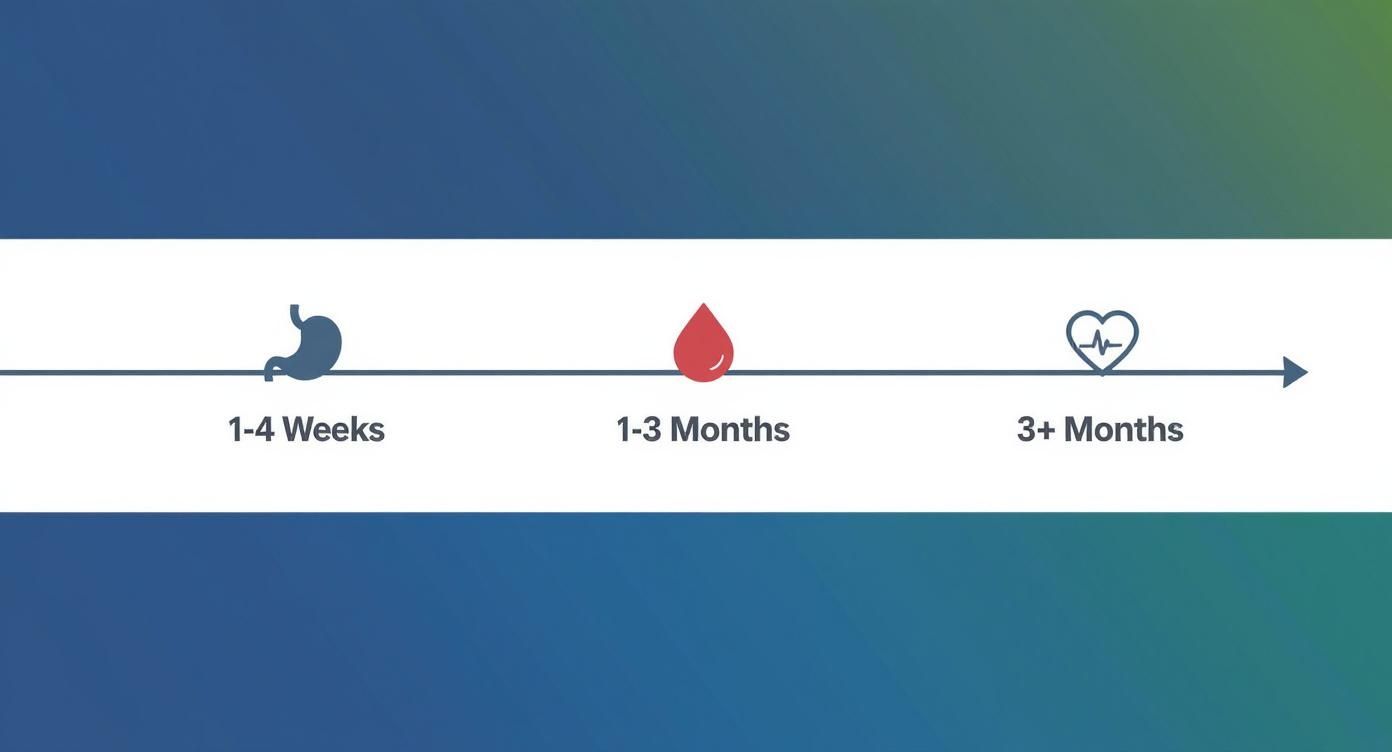How Long Does Berberine Take to Work: A Science-Backed Timeline

When you commit to a new supplement, the first question is always, "How long until I see results?" It’s a practical question, and with a powerful compound like berberine, the answer is rooted in cellular biology and requires patience.
You can typically expect to see measurable changes in key health markers, such as blood sugar levels, within two to three months of consistent, daily use. While some subtle effects may appear sooner, the most significant benefits emerge as berberine systematically enhances your body's cellular processes.
Understanding Your Berberine Timeline
Think of starting berberine less like flipping a switch and more like cultivating a garden. It takes time for the compound to integrate into your system and foster lasting change. Berberine's effects build gradually as it works on your body's core metabolic machinery.
How quickly you see results depends on your unique physiology—your diet, lifestyle, dosage consistency, and individual metabolism all play a role.
This visual guide provides a clear overview of what to expect, from the initial adaptation phase in your gut to the profound metabolic and cardiovascular support that follows.

As you can see, the most well-documented benefits—such as improved blood sugar regulation and healthier cholesterol profiles—begin to manifest after the first month of consistent use.
The Initial Phase: The First Four Weeks
The first month is about adaptation. As your body acclimatizes to this new, active compound, much of the initial action occurs within your gut microbiome. Berberine is known to influence gut flora, so it’s not uncommon to experience mild digestive adjustments.
This is a temporary and normal sign of change. While you won't see major shifts in lab results yet, this period is critical for establishing the foundation for future benefits and building a consistent daily routine.
The Impact Phase: One to Three Months
This is where the science becomes visible. After the initial adaptation, berberine’s influence at the cellular level begins to yield measurable results.
This is the window where clinical research consistently shows significant improvements in fasting blood glucose and HbA1c levels. The key to unlocking these changes is consistency. Daily supplementation is essential to give the compound time to optimize your metabolic pathways.
At Vitruvin, we view this phase as the heart of proactive wellness. You’re not just addressing symptoms; you’re supporting your body’s fundamental operating systems. It's an investment in your long-term vitality and a cornerstone of healthy aging.
The Optimization Phase: Beyond Three Months
Continuing with berberine for three months and beyond is where you lock in and build upon the benefits. Your body becomes more efficient at managing energy, which can lead to sustained improvements in cardiovascular health markers like LDL cholesterol and triglycerides.
This is not a short-term fix; it's a long-term strategy for cellular health. Viewing supplements like berberine as trusted allies on your wellness journey makes a profound difference. By committing to the process, you empower your cells to function optimally, building a resilient foundation for years to come.
To make it even clearer, here's a quick summary of what to expect and when.
Expected Timeline for Berberine's Effects
This table outlines the typical timeframe for observing measurable changes in key health markers with consistent berberine supplementation.
Health Goal
Typical Onset of Action
Optimal Results Timeline
| Gut Health & Adaptation | 1–4 weeks | Ongoing adjustments |
| Blood Sugar Management | 1 month | 2–3 months |
| Cholesterol & Triglycerides | 2 months | 3+ months |
| Cardiovascular Support | 3 months | 6+ months |
Remember, these are evidence-based guidelines. Your personal results will depend on a combination of factors, but this timeline provides a solid roadmap for your journey with berberine.
How Berberine Works Inside Your Cells
To truly appreciate why berberine takes time to work, we need to zoom in on its microscopic mechanism of action. Berberine isn’t a simple supplement; it’s a sophisticated conductor for your cellular orchestra, ensuring your energy-producing machinery operates in harmony.

Its primary action is activating a critical enzyme called AMP-activated protein kinase (AMPK). Think of AMPK as your body's "metabolic master switch." When cellular energy is low, AMPK is activated, initiating a cascade of events designed to restore energy balance and optimize fuel usage.
Activating Your Metabolic Master Switch
When berberine activates AMPK, it sends a direct command to your cells to become more efficient. This activation is the foundation for the metabolic benefits observed over the following weeks and months. It effectively retrains your body to manage energy more effectively—a key component of healthy aging and longevity science.
This is precisely why berberine is known for a wide range of benefits. By targeting one of the central control points of metabolism, it influences a whole network of interconnected systems.
Here are the key actions that AMPK activation sets in motion:
- Improved Glucose Uptake: AMPK signals cells to absorb more glucose from the bloodstream for immediate energy, which helps maintain stable blood sugar levels.
- Enhanced Fat Burning: It promotes the use of stored fat for fuel, a vital process for managing weight and improving metabolic flexibility.
- Reduced Liver Sugar Production: It inhibits the liver from producing and releasing excess glucose into the blood when it is not needed.
This powerful trio of actions works synergistically to create a more balanced and efficient internal system. By supporting these core functions, you are literally building better health from the cells up. To dive deeper into how these processes fuel your overall wellness, check out our guide on what is cellular health.
The Foundation for Long-Term Vitality
This cellular recalibration doesn't happen overnight. It's the consistent, daily activation of AMPK that gradually leads to noticeable improvements in your health. Each dose contributes to this cumulative effect, strengthening your body's innate ability to manage energy and maintain homeostasis.
This understanding shifts the conversation from "how long until berberine works?" to "how is berberine setting me up for better health down the road?" It’s a powerful way to enhance cellular energy and support proactive aging.
The First 12 Weeks For Blood Sugar And Insulin
The first three months of taking berberine are typically when you start to see the most significant, measurable changes in your metabolic health. This isn't an overnight fix. It is a foundational period where berberine systematically teaches your body to manage blood sugar and insulin sensitivity more effectively.
During this crucial 12-week window, the consistent activation of the AMPK pathway begins to deliver tangible returns. Your cells become more receptive to insulin, enabling them to pull glucose from your bloodstream much more efficiently for energy. It's this steady optimization that leads to real improvements in key health markers.
Tracking Your Progress
One of the most empowering aspects of this phase is that the benefits are quantifiable. Many individuals notice a clear shift in their fasting blood glucose levels and their HbA1c—the key marker reflecting average blood sugar over the last two to three months.

To get a clear picture of how berberine is working for you, it's worth looking into various glucose monitoring solutions. Having objective data provides invaluable feedback, showing you how your body is responding and providing motivation to stay consistent.
Clinical studies consistently point to this 12-week period as a major milestone. It's the timeframe where berberine's impact on glucose metabolism becomes scientifically validated, confirming that the patience invested during the initial weeks truly pays off.
This isn’t just about numbers; it's about providing your body’s natural systems with the support they need to function optimally. By improving how your body uses energy, you're making a direct investment in a more resilient metabolic future.
Evidence-Backed Results
The scientific evidence supporting berberine's effectiveness within this three-month period is robust. Numerous studies have demonstrated its significant impact on blood glucose control and even weight management, with impressive improvements seen after just 12 weeks of consistent use.
For example, a 12-week study where participants took 500 mg of berberine three times a day yielded remarkable results. Participants lost an average of 5 pounds and saw their body fat decrease by 3.6%. Furthermore, their fasting blood glucose fell by 20%, and their HbA1c decreased by 12%, underscoring berberine's potent effect on long-term glucose control.
This evidence reinforces the importance of consistency, especially during these first three months. By combining a high-quality supplement with smart lifestyle choices, you create a powerful foundation for your wellness and vitality for years to come.
Improving Cholesterol and Cardiovascular Health
While berberine is renowned for blood sugar management, its benefits extend to long-term cardiovascular health, primarily by supporting healthy cholesterol levels. The timeline for these heart-healthy effects often aligns with its impact on glucose, with measurable improvements typically seen within the same 2 to 3 month timeframe of consistent, daily use.
Taking this proactive step is what modern wellness is all about. Instead of reacting to problems, you are actively supporting your body's systems to maintain balance and strength, fostering vitality from within.

The Science of Cholesterol Management
How exactly does berberine achieve this? The process is fascinating and begins in the liver, your body’s central cholesterol-processing hub.
Berberine enhances the liver's ability to clear LDL (the "bad") cholesterol and triglycerides from the bloodstream. It accomplishes this by increasing the activity of LDL receptors on liver cells, which are responsible for removing these fats from circulation.
This is not a temporary fix but a fundamental improvement in how your body handles lipids. By making this natural cleanup process more efficient, you are directly contributing to a healthier cardiovascular system. To appreciate the full picture, it helps to understand the role of cholesterol in heart health and why balance is crucial.
This type of cellular support is at the core of the Vitruvin philosophy. True wellness isn't about quick fixes; it’s about providing your body with the high-quality tools it needs to function at its best, building natural resilience that lasts.
The science consistently validates these effects. Clinical studies have shown that berberine can significantly lower both LDL and total cholesterol in just a few months.
For instance, one study found that patients taking 500 mg of berberine twice daily saw their LDL cholesterol decrease by an average of 23.8% in just two months. The same research highlighted significant reductions in total cholesterol, demonstrating the compound's reliability in supporting lipid metabolism. You can explore the full study on berberine's cholesterol-lowering effects to review the data.
To achieve these science-backed results, the purity and potency of your supplement are paramount. Choosing a high-quality source is essential for providing your body with an effective tool on its wellness journey.
What Affects Your Berberine Timeline?
So, how long does berberine take to work? While most people see noticeable changes within two to three months, there is no universal answer. Your individual results can vary, and several key factors can influence your progress.
Berberine is a powerful tool, but its effectiveness depends on how it's used and the biological environment it's introduced to. Your physiology, daily habits, and supplement quality all play a crucial role.
Consistency and Dosage
The most critical factor is consistency. Sporadic use will not yield results. The compound must accumulate in your system to deliver its metabolic benefits, which only occurs with daily supplementation.
The standard dose used in most clinical research is 1,500 mg per day, typically divided into three 500 mg doses taken with meals. Taking berberine with food, particularly meals containing carbohydrates or fats, enhances absorption and helps mitigate potential digestive discomfort.
The Power of Diet and Exercise
You cannot out-supplement a suboptimal lifestyle. Your diet and physical activity levels are major determinants of your success with berberine, especially for metabolic health.
Combining berberine with a diet low in refined sugars and processed carbohydrates creates a powerful synergistic effect. This approach supports stable cellular energy and helps berberine work more efficiently, amplifying its benefits for glucose control and healthy aging.
Incorporating regular exercise further enhances these effects. Exercise naturally improves insulin sensitivity, creating the ideal physiological environment for berberine to deliver results more rapidly.
Supplement Quality and Bioavailability
Not all berberine supplements are created equal. The purity, potency, and bioavailability (the amount your body can absorb and utilize) of your supplement are critical. A low-quality product may contain fillers or a lower dose than advertised, preventing you from reaching the therapeutic levels needed for real change.
To optimize your journey with berberine, it's essential to understand how these factors interact.
Optimizing Your Berberine Timeline
Factor
Impact on Timeline
Practical Tip
| Dosage & Consistency | High Impact. Sporadic or low doses significantly delay results. | Take 500 mg three times daily with meals. Set reminders to stay consistent. |
| Diet | High Impact. A high-sugar, processed diet works against berberine. | Focus on whole foods. Limit refined carbs and sugars to support berberine's work on glucose metabolism. |
| Exercise | Moderate-High Impact. A sedentary lifestyle limits insulin sensitivity gains. | Aim for at least 150 minutes of moderate activity per week to enhance berberine's effects. |
| Bioavailability | High Impact. Poor absorption means less active compound reaches your cells. | Choose a high-quality supplement from a reputable source that prioritizes purity and potency. |
| Individual Metabolism | Moderate Impact. Your unique genetics and gut health affect absorption. | Be patient. If you're not seeing results after 3 months, consult a healthcare provider to review your approach. |
By managing these factors, you take control of your results.
This is why choosing a trusted source like Vitruvin is so important. Our commitment to clean, potent formulas ensures you're giving your body an effective tool for your health goals. You can explore our full range of science-backed supplements in the Vitruvin shop to build a routine that supports your longevity goals.
Sustaining Your Results For Long-Term Vitality
Achieving positive initial results with berberine is an important milestone, but the true benefits are realized through long-term, consistent use. The first three months set the stage; what follows is a serious investment in your lifelong metabolic health and graceful aging.
The focus shifts from hitting initial targets to building a sustainable strategy for vitality. Over time, berberine’s benefits compound, offering continuous support for healthy weight, stable cellular energy, and a resilient cardiovascular system. It becomes a trusted partner in keeping your body functioning optimally for years to come.
A Long-Term Investment in Cellular Health
Viewing berberine as a long-term partner is aligned with the science of longevity. Just as you wouldn't expect a few gym sessions to provide lasting fitness, supplements require consistency to unlock their most profound benefits.
With ongoing use, berberine helps maintain the optimized metabolic state you worked to achieve. This means your cells remain responsive to insulin and continue to manage lipids efficiently—critical for navigating the aging process with energy and vitality. This steady support builds a strong foundation for the decades ahead.
"The goal is to move from simply reacting to health issues to proactively building a strategy for vitality. Consistent use of a high-quality supplement like berberine becomes a core part of a lifestyle dedicated to a longer, healthier future."
Integrating Berberine into Your Longevity Plan
To sustain these powerful results, integrate berberine into a comprehensive wellness plan. Create a powerful synergy by pairing it with a nutrient-dense diet, regular exercise, and high-quality sleep. Combining these habits amplifies berberine's benefits.
This holistic approach is central to the Vitruvin philosophy of empowering individuals on their journey toward enhanced vitality. When you choose a pure and potent supplement, you’re making a deliberate choice to support your health from the cellular level up. See how Vitruvin’s premium Berberine can become a cornerstone of your long-term wellness strategy.
Adopting this proactive mindset turns your daily routine into a powerful commitment to a vibrant, energetic future.
Common Questions About Taking Berberine
When exploring supplements for healthy aging, a few practical questions often arise. Here are clear, evidence-based answers to common inquiries about berberine.
When Is The Best Time To Take It?
Timing can make a significant difference. To maximize absorption and minimize potential stomach upset, it is best to take berberine with or immediately after a meal.
A meal containing some carbohydrates or fats is ideal. Many people find that splitting the dose—for example, 500mg with breakfast and 500mg with dinner—helps maintain stable levels in the body throughout the day for consistent metabolic support.
Can I Take Berberine With Other Supplements?
Yes, berberine often complements other longevity-focused supplements. It is known for activating the AMPK pathway, a core metabolic regulator.
This action works synergistically with supplements like NMN or Resveratrol, which target related pathways to support NAD+ levels and cellular energy production. According to longevity science expert Dr. David Sinclair, combining AMPK activators with NAD+ boosters can create a powerful effect on cellular health.
As always, it is wise to consult with your healthcare provider before combining new supplements. They can help you create a personalized plan that aligns with your specific health needs and goals.
What Happens If I Stop Taking Berberine?
Berberine's benefits depend on consistent use. If you stop taking it, your metabolic markers, such as blood sugar and cholesterol, will likely return to their previous levels over time.
It is best viewed as a long-term commitment to metabolic health, not a temporary fix.
Should I Expect Any Side Effects at First?
Some individuals may experience mild digestive issues when they first begin, such as bloating or an upset stomach. This is common and typically resolves within a week or two as your body adapts.
Starting with a lower dose and always taking it with food can help minimize this initial adjustment period.
A proactive approach to your health today is the greatest investment you can make in a vibrant tomorrow. By supporting your body at the cellular level, you empower yourself to age with vitality and grace.
Discover how Vitruvin’s premium NMN can support your longevity goals.



Comments